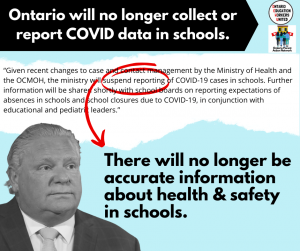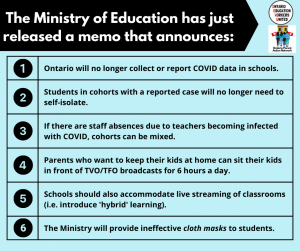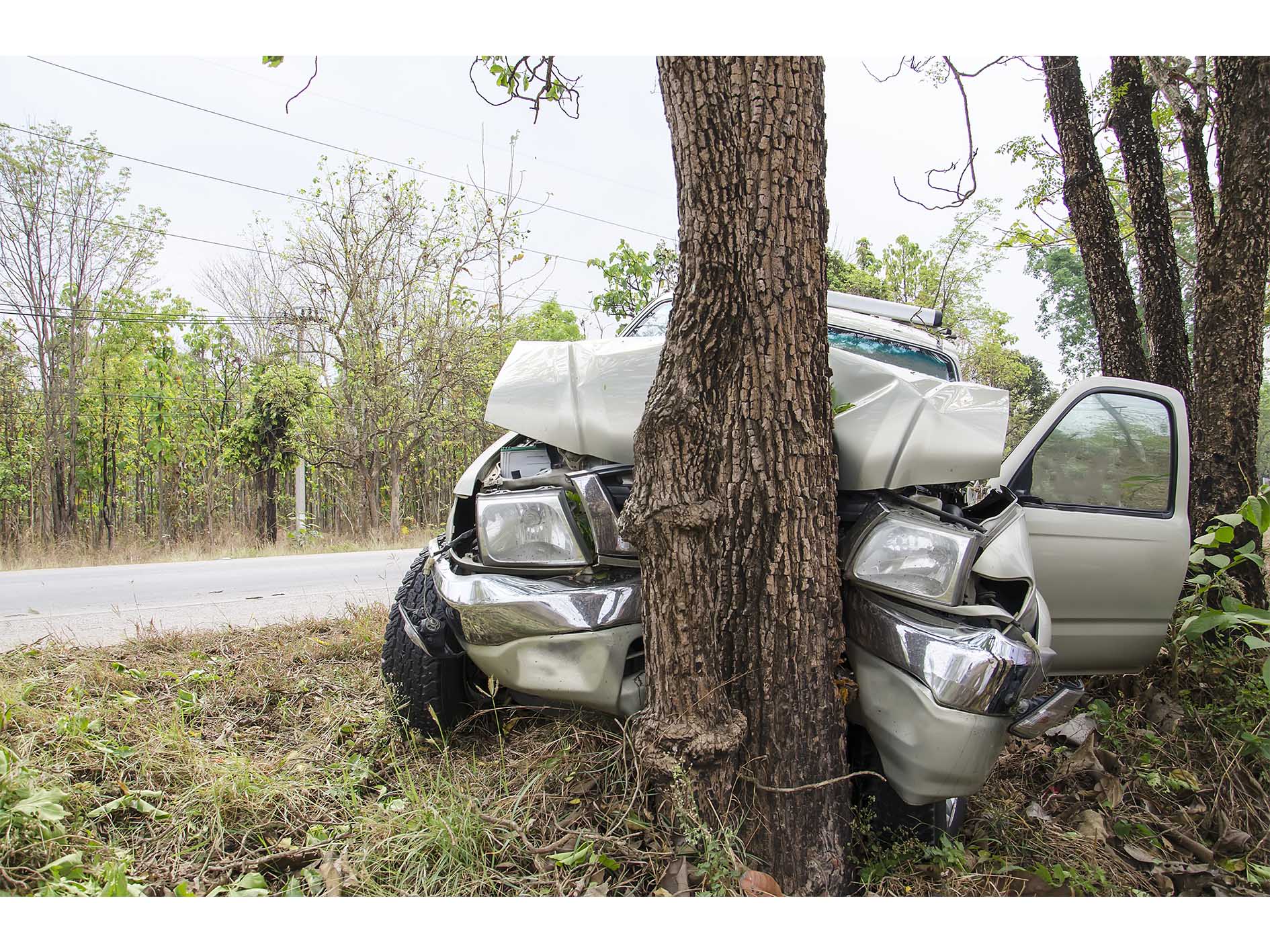Doug Ford is “bracing for impact.” What about everyone else?
Are you having trouble finding a second or third dose of vaccine?
Call 1 833 943 3900
Do you want to find out more about what education workers are doing to advocate for schools, families and workers?
Click here: Ontario Education Workers United (OEWU)
Do you want to find out more COVID cases in schools?
Click here: Protect Our Schools
Sure – the Ford government is good at ramming through legislation to cut basic services. It can push out a new highway we don’t need through farmland we do. It can take care of its friends and hinder pesky unions and others from raising money to fight it. Over and over again Doug Ford and Co. have taken care of business.
But can they govern – actually make decisions and support them with a plan as people everywhere face the 1st 2nd 3rd and now 4th wave of COVID-19?
The answer is “no.” We watched cases of the shockingly virulent Omicron variant of COVID go through the roof and waited for this government to act. It came up with half-measures like reducing social gatherings and making bars close early. Then, while Omicron cases went vertical the Ford government decided to limit who could get the more accurate PCR (polymerase chain reaction) test – the one that might let us know what’s going on with infection rates around us. Not now. As recently as December 29 we didn’t know what the province’s plan was for return to school. The next day we were told that students would be returning to school on Wednesday January 5. How was this going to help with anything? The Tories were clearly hoping for the best.
Crashing
It didn’t happen. Yesterday, Mr. Ford said we are “bracing for impact.” As case counts rise exponentially, “we could see hundreds of thousands of cases every single day.” With that he ordered schools to go ahead with virtual learning for at least the next two weeks, imposed a pause on non-emergency surgeries, set restrictions on gathering and imposed closures.

The way Dr. David Fisman, epidemiologist at the Dalla Lana School of Public Health sees it, “the government has waited until we’ve crashed into a tree.” He was speaking at an online meeting set up by the Ontario Parent Action Network (OPAN) and Ontario Education Workers United (OEWU). He told the roughly 500 people attending, that with daily hospital and ICU admissions spiking, we’ve been heading into a full-fledged healthcare crisis.
Muna Kadri, district president of Ontario Secondary Schools Teachers Federation (OSSTF) for York Region told the group that she’s seeing no general testing and contact tracing going on in schools, no whole class dismissals for COVID exposures and little access to PCR testing for education workers. The 3 000 additional HEPA filter units the province has ordered for Ontario schools added to the 70 000 in classrooms already amounts to only 10 units per school. Education workers will be getting the proper N-95 masks to wear in school but what about students, showing up to school with cloth masks?
The situation now
The reality in schools, according to York Region secondary student, Elena Rinne, is “scary” There’s no social distancing, “no follow-up if someone was to get sick.” Masks are virtually non-existent, she said, as kids either refuse to wear them or have exemptions.
The government has brought in all of these restrictions to ease the burden on a health care system that’s already in trouble. Durham ICU nurse Birgit Umaigba, said hospitals are short staffed with as few as one nurse per two patients in Intensive Care Units (ICU) and the lowest RN to population ratio in the country. Attracting nurses isn’t helped by the Tories’ cap on public sector wages. Patients, she said, might be ready to leave an ICU, but there are not enough nurses to receive them -so the whole system gets backed up. For families affected by COVID, parents can’t afford to take the time off they need – there are not enough paid sick days.
Then there are the kids. They’ve already missed 26 weeks of school and are suffering. Secondary teacher Melanie Willson told School that we need to counter the idea that you have to have kids in school, no matter what the cost, but she sees the “mental health impacts, depression, anxiety and feeling socially isolated” that students have to face. It’s something that keeps going on year after year as the province opens and closes schools based on crises rather than planning. Teacher Sara Vance agrees that this “yo-yoing is the most difficult thing for students.” Then there are the continuing negative effects of job loss, eviction and poverty that hit vulnerable families. How do you help a student trying to sift out all the competing stresses of living at home with brothers and sisters, while trying to learn?
Grade 7 teacher, Laura McCoy sees similar issues. Opening and closing schools just adds to the problem. It’s crucial to attend school – to be there in person, just to connect with others. She encounters kids who are discouraged, disengaged, anxious and depressed. But schools need to be safe. As far as she’s concerned this government has been late in coming up with a plan and has no knowledge of public education and its importance to young people.
The Tories’ cheap-out-too-late-maybe-a-bit-now-OK- we’re-stopping-everything-back-and-forth approach to COVID means that vulnerable kids suffer even more. Early on in the pandemic, the Vanier Institute reported that recent immigrants and low income families, predictably, had to deal with greater loss of income and the stress that came with it. This was especially pronounced in families with children who were missing out on school. Practically speaking it comes down to who can provide their kids with the best masks, extra tutoring and a space in the house to attend online school – that sort of thing. Who can work from home and supervise their children? Who can afford to take time off? Who can provide the most up-to-date platforms for learning? Who can take their families out for a safe walk? Maybe a holiday at a cottage?
Just as important though is the recovery that will need to happen once students can consistently return to school. Those who already have had to sustain themselves somehow over the last two years will need a massive amount of help and support to relearn and catch up a bit on the most basic skills – writing, responding to what to what they read – even being able to understand it. High school teachers have been worried for years about seriously declining literacy skills – ones that are needed just to be engaged in the world. The situation is much worse now and we need to figure out how to teach and support these kids.
What now?

So, now that we’re in the middle of yet another crisis, what can we do? Dr. Nila Kaplan-Myrh called for more rapid tests, so we can at least get some idea of our circumstances, political pressure for more N-95 masks and ventilators to make sure that everyone can get them – that “it’s not a privilege to have some sort of safety.” She has set up JABAPALOOZAs since last spring to get as many second and third doses in arms as possible. She knows it’s tough, buts says people should avoid congregating with others outside their bubble. Her advice in light of what we face:
-
- Any symptoms? Assume it’s COVID
- If you can- book tests
- Isolate for ten days, if you can afford it.
David Fisman added, along with proper testing and masking, how critical it is for teachers at a bare minimum, to have their third shots when schools reopen; teens don’t need to wait so long for their next dose. Classrooms should have fewer students in them to lessen the chances of infection – though reduced class size was never in the cards for this government. But, the larger picture involves understanding how to get clean air into our schools: “do what we did to sewage 120 years ago” and clean it up. This is timely advice considering governments over the years allowed a $16 billion backlog in school repairs to develop.
Solidarity
It’s so encouraging to see how OPAN and OEWU are working together to take on the Ford government over COVID and other issues, as the provincial election approaches. OPAN parent, Jess Lyons outlined basic demands to make schools safe for the most affected in our schools – racialized, low-income and immunocompromised people. They include the 13-day school delay paired with a drive to vaccinate students and staff at school vaccine clinics, while expanding a pilot project for take-home PCR tests. The groups call for more rapid testing, more HEPA machines, better collection of COVID case data, along with 10 paid sick days and 10 emergency leave days for workers across the province, a rent freeze and continued supports for families affected by closures. Also – don’t use hybrid methods for online teaching.
About 200 education workers took part in a phone-zap -sending this message to Doug Ford and his Ministers: Stephen Lecce, Christine Elliott and Monte McNaughton.
In the end – and in June – it probably comes down to a remark by parent Shameela Shakeel who urged us to find that energy “to vote in a compassionate leadership from now on.”

